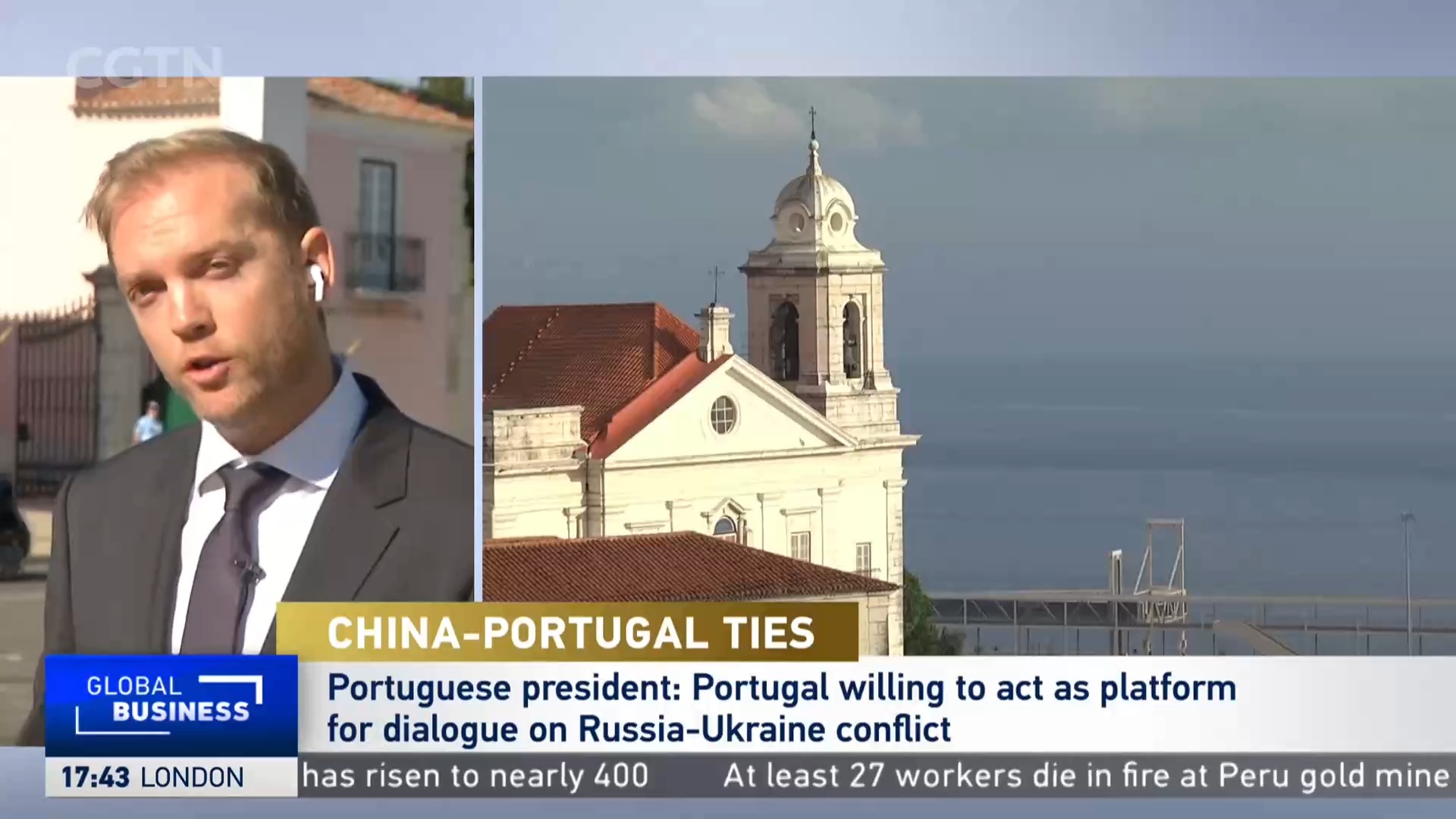01:34

China Vice President Han Zheng has finished his four-day visit to Portugal, pledging to deepen bilateral ties and strengthen trade between the two nations.
Han met both Portuguese Prime Minister Antonio Costa and President Marcelo Rebelo de Sousa in Lisbon.
"We discussed the deepening of the bilateral relationship, in areas such as the energy transition, tourism and agri-food," the Prime Minister's office later published on official channels.

Han Zheng at a reception hosted by Britain's King Charles, for overseas guests attending his coronation at Buckingham Palace, last Thursday. /Jacob King/Pool
Han Zheng at a reception hosted by Britain's King Charles, for overseas guests attending his coronation at Buckingham Palace, last Thursday. /Jacob King/Pool
The Portuguese government welcomed the fact that Han had come to Portugal on his first tour abroad.
"The inclusion of Portugal in Vice-President Han's first tour abroad is a sign of the importance of friendship between Portugal and China," read the communication from Costa's office.
The statement also spoke about "bearing in mind the need to find a greater balance in our commercial exchanges."
Trading since the 16th century
China-Portugal commerce dates back to the 16th century, when traders used their hub in Macao to ship huge quantities of Chinese silk and Asian spices home.
Now the dynamic is a little different as Portugal is one of the top European destinations for Chinese investment.
Since the turn of the century, well over ten billion dollars in foreign direct investment (FDI) have poured into the country from China, making it the fourth-largest foreign investor in Portugal, behind only neighboring Spain, France and the UK.
That puts Portugal in Europe's top 10 destinations for Chinese FDI, higher on the list than larger economies like Belgium and Netherlands.
READ MORE
How did the commonwealth react to Charles's coronation?
Why pot-banging became a global protest symbol
Ding Liren makes chess history
China invested heavily in utilities like electricity, water and gas sectors, with a particular focus on renewable energy during 2011-2014's 'Portuguese privatization program' as the Lisbon government responded to the eurozone economic crisis.
Chinese investors both helped provide Portugal with a much-needed injection of cash and snapped up bargains – such as China Three Gorges' 21 percent stake in state power company EDP for around $3 billion, at the time the largest acquisition in Europe by a Chinese investor.
They also bought a 49 percent stake in EDP Renewables for just under $400 million – both those deals coming in 2011. A 25 percent stake in REN, which runs Portugal's electricity grid, followed in 2012.
There has also been much investment in the banking, insurance and healthcare sectors, which are now mature investments.
China's Fosun International now has around a 30 percent stake in Portugal's biggest bank, investing also in the insurance industry and in Luz Saude, the country's biggest healthcare provider.
Trade isn't a one-way street, though. Recently Portugal became the first EU country to purchase made-in-China metro trains with an order for 18 low-consumption, high-tech smart trains worth over $50 million.
The China Railway Rolling Stock Corp's Tangshan trains will serve on metro lines in Porto, with all 18 trains set to be delivered by September. Each will have a capacity of 346 passengers and a top speed of 80 kilometers per hour.
'Platform for peace'
As a NATO member, Portugal's stance aligns with the rest of the members and the European Union countries, and while recognizing that China's position differs, the Portuguese leaders stressed their openness to dialogue and to all parties who can help bring about peace.
Comments also revealed a keenness that Portugal is seen as providing a "platform for peace."
"Portugal wants to position itself as the first choice for Chinese investment in Europe, but also with a view to other continents where Portugal enjoys a privileged relationship, like Africa and Latin America," Economy Minister António Pires de Lima told China Radio International in Shanghai recently.
With potential for growth in the renewable energy market and maturing partnerships with companies like EDP, Portugal could potentially facilitate China investments in Portuguese-speaking countries like Brazil, Cape Verde, Mozambique and Angola.
In the past, Chinese investment has focused on utilities, banking and health, but recent years have seen more Chinese capital flow into real estate, through developers of luxury housing or purchasers under the Golden Visa program.
Chinese companies are increasingly setting up their own plants in Europe too, and there is a new strategy of backing European start-ups with potential.
The next stop of Han's tour is the Netherlands.
Subscribe to Storyboard: A weekly newsletter bringing you the best of CGTN every Friday